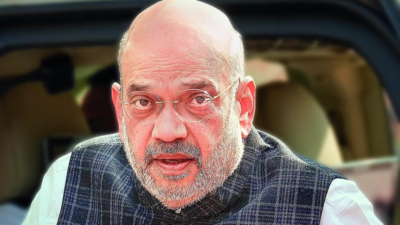NEW DELHI: Home minister Amit Shah on Wednesday asserted that the changes being carried out in the Waqf Act would be firmly enforced, adding that every citizen would be required to adhere to them.
Responding to statements from opposition benches that Muslims would not accept the amendments in the Waqf Act, Shah said, “Who are you threatening? This bill is going to be passed by Parliament and will apply to all. The coming law will be an enactment of govt of India and every citizen will be obliged to comply with it.”
In a forceful intervention which saw him alternating between dismissal of opposition’s criticism as scaremongering and a staunch defence of the Waqf (Amendment) Bill as a necessity for checking corruption and arbitrariness of the waqf bureaucracy, Shah said, “They are making misleading claims to scare Muslims so that their vote bank remains intact.”
He cited provisions of the bill to argue that it was not an encroachment on the religious rights of Muslims, and pointed out that despite the opposition’s claims to the contrary over amendments to the Citizenship Act, “not a single Muslim has lost his citizenship because of CAA”. He said the bill covered waqf boards, waqf councils and waqf tribunals which were administrative bodies, and did not extend to management of mosques which would remain under Muslims.
Shah criticised changes in the Waqf Act carried out by the Congress-led UPA govt in 2013 as part of the “politics of appeasement”. He said the latest version of the Act more than doubled the area under waqf properties – from 18 lakh acres to 39 lakh acres. The home minister also pointed out that the orders of waqf tribunals were rendered immune from judicial scrutiny, with revenue courts and civil courts being divested of the power to hear appeals.
“These days, it is fashionable to move around brandishing the Constitution. Can anything be more unconstitutional than putting a body above judicial scrutiny? You changed the law for politics of vote bank and we have now cancelled the changes,” Shah said, pointedly refuting the contention of Congress’s deputy leader in LS Gaurav Gogoi who had said that appeals against orders of tribunals were not barred. “You have tried to mislead. Civil suits, where the interests of original occupants are given precedence, were indeed barred. Only writs were allowed. You know the difference but you are obfuscating it only for the sake of vote bank politics,” he added.
Shah argued that the changes would benefit Muslim masses by bringing transparency and eliminating corruption. “In 2013, 20,000 properties were shown as leased. Now, the latest records show there are none. What happened? Were the properties sold off?” he asked.
The minister used other tracks as well – playing up support for the bill from a host of Christian bodies, claims made by waqf bodies on lands associated with temples and churches, and provisions of the bill which stipulate that land owned by SCs/STs would not come under waqf. He also struck an assertive note with regard to other provisions, such as that a Muslim can donate only his personal wealth and assets to waqf, that is, an Islamic endowment. “How can one donate a govt or public property to waqf?” he asked.
Shah concluded by expressing confidence that Muslims would realise the benefit of the amendments. “In four years, even Muslim brothers will realise that this bill is actually in their benefit,” he said.


